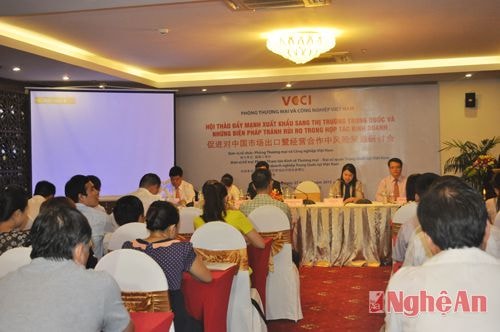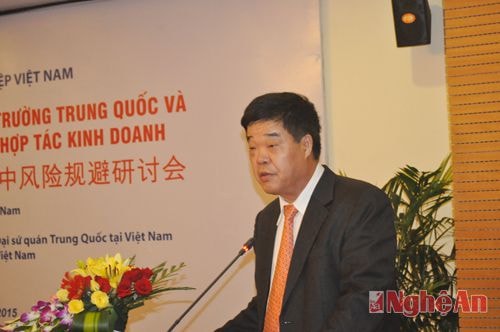Boosting exports to the Chinese market and measures to avoid risks in business
(Baonghean.vn) - On August 27 in Vinh City, the Vietnam Chamber of Commerce and Industry Branch in Nghe An coordinated with the Chinese Embassy in Vietnam and the Chinese Business Association in Vietnam to organize a workshop on "Promoting exports to the Chinese market and measures to avoid risks in business cooperation".
 |
| Conference scene |
Attending the workshop were comrades: Hua Kai Song, Economic and Commercial Counselor, Chinese Embassy in Vietnam; Vuong Quy Quan, Vice President of the Chinese Enterprise Association in Vietnam; and representatives of departments, agencies, organizations, business associations and enterprises in Nghe An.
 |
| Mr. Hua Khai Tung - Economic and Trade Counselor, Chinese Embassy in Vietnam introduced Vietnam - China economic and trade relations |
Up to now, Nghe An province has 9/52 FDI projects from China, with a total registered investment capital of 111.08 million USD, accounting for 17.31% of the number of FDI projects and 7.08% of the registered capital of FDI projects in the whole province. In recent years, trade relations between Nghe An and Chinese enterprises have been constantly consolidated and developed, import and export business activities of Nghe An enterprises have continuously grown in many aspects such as turnover, goods, markets, and number of participating enterprises.
 |
| Ms. Vo Thi An, Deputy Director of Nghe An Department of Industry and Trade presented a paper at the workshop. |
The number of enterprises operating in import-export business in Nghe An has been growing steadily over the years, currently there are about 150 enterprises participating in import-export business, of which about 50 enterprises have business with the Chinese market. In 2014, the export turnover of the whole province reached 411 million USD, of which the export to the Chinese market was 183.8 million USD, accounting for 44.7%; and in the first 7 months of 2015, the export turnover of goods reached 237 million USD, of which the Chinese market was 103.8 million USD, accounting for 43.8%. Every year, enterprises in the province export to the Chinese market more than 13 items, some items with large turnover such as cassava starch, wood chips, textiles, phone components, seafood.
 |
| Mr. Vuong Quy Quan, Vice President of the Chinese Business Association in Vietnam, spoke at the conference. |
In 2014, the province's total import turnover reached 361.5 million USD, of which imports from the Chinese market reached 64.8%, accounting for 17.9% and in the first 7 months of 2015, imports from China reached 23.1 million USD, accounting for 13%, with main items including machinery and equipment, production materials, phone components, rice seeds, fertilizers, tires of all kinds...
However, the biggest difficulty for businesses exporting to China is payment. In addition to the problem of delayed payment, China strictly manages foreign currency and limits payment in USD. China has not yet widely implemented the international payment method of L/C (Letter of Credit), so the level of payment security is not high....
 |
| Ms. Ho Thi Thu Ha, Director of An Thinh Joint Stock Company, exchanged opinions at the workshop. |
To increase market share and avoid risks when doing business with the Chinese market, Nghe An enterprises need to pay attention to investing in: Having stable medium and long-term agricultural product purchasing contracts (for agricultural product processing enterprises); Having a strategy to penetrate and develop products in the Chinese market and having a strategy to build, promote and register brands domestically and internationally. At the same time, they must proactively seek out partners by hiring special Chinese enterprises that are capable of assessing the background and financial capacity of Chinese enterprises...
This conference is an opportunity for businesses to exchange information and experiences as well as to answer questions in business cooperation between the two sides. Businesses are also concerned about China's recent devaluation of the yuan, which may be a sign of a slowing economy or a policy to boost China's exports. In particular, the dispute over the East Sea has affected the partnership between the two sides and the import and export of goods between Vietnam and China...
Quynh Lan






